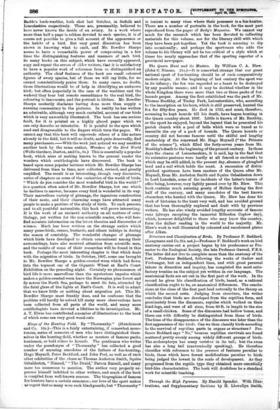The Quern Hunt and its Masters. By William C. A.
Blew. (John C. Nimmo. 21s.)—It is somewhat strange that our great national sport of fox-hunting should be of such comparatively modern origin. At the beginning of last century the sport was in its infancy; the fox was regarded as a beast to be destroyed by any possible means ; and it may be doubted whether in the whole Kingdom there were more than two or three packs of fox. hounds proper. Among the first established was the pack of Mr. Thomas Boothby, of Tooley Park, Leicestershire, who, according to the inscription on his horn, which is still preserved, hunted the fox for fifty-five years. He died in 1752, and must, therefore, assuming he kept hounds till his death, have begun hunting in the Quorn country about 1697. Little is known of Mr. Boothby, or the sport he enjoyed, beyond the legend that he presented his parish church with a peal of bells which were so tuned as to resemble the cry of a pack of hounds. The Quorn hounds or country did not become famous until the skilful and lengthy mastership of the renowned Mr. Hugo Meynell (" the Primate of the science "), which filled the forty-seven years from Mr. Boothby's death to the beginning of the present century. In those days the charm of Leicestershire, it is said, lay in the fact that its extensive pastures were hardly at all fenced or enclosed ; to which may be still added, in the present day, absence of ploughed land and a soil which holds the scent. A succession of distin- guished sportsmen have been masters of the Quorn after Mr. Meynell, from Mr. Assheton Smith and Squire Osbaldeston down to Lord Lonsdale, some of the incidents of the latter's tenure of office being, however, very lightly passed over by Mr. Blew. This book contains much amusing gossip of Melton during the first half of the century, and many anecdotes of the best known characters who hunted with the Quorn. Mr. Blew has done his work of historian to the hunt very well, and has avoided ground that has been thoroughly explored and dealt with by previous writers. He has also wisely avoided lengthy accounts of famous runs (always excepting the immortal Billesdon Coplow day), which, however delightful to those who may know the country, form the dullest reading in the world to the majority. Mr. Blew's work is well illustrated by coloured and uncoloured plates after Aiken.






















































 Previous page
Previous page